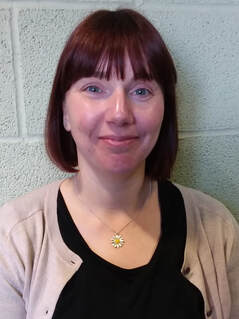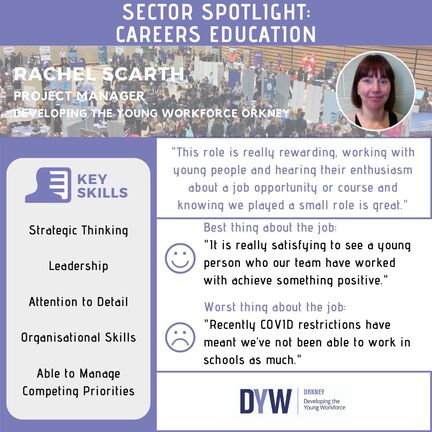 Today’s Sector Spotlight on Careers Education features Rachel Scarth, Project Manager for Developing the Young Workforce Orkney. While at school, Rachel wanted to be a journalist, but after she didn’t get into her preferred university course, had to reconsider her options. She completed an HND in Journalism, followed by a degree in English. During a year out travelling, Rachel wrote about her travels for a local newspaper and undertook work experience with them on her return, alongside full-time working. Time spent working for a temp agency undertaking various admin roles led to a typist job with Grampian Police and when a job came up in their Corporate Communications Department as a Media Officer, she applied. Rachel spent 12 years with the police in a variety of roles before returning to Orkney to take on her current role with DYW Orkney.  Can you describe a typical day in your role as Project Manager? A typical day would see me attending meetings, responding to emails, planning and delivering aspects of our work and monitoring our external communications channels. Some of the meetings I attend include those with my team to discuss their workloads and offer support to them. I also meet with a variety of different partners to discuss our role and explore ways to work together. These partners include Skills Development Scotland, Community Learning and Development, the schools and college and the Education Department. Employer engagement is key to our role, so I also meet with local business people to discuss how we can work together. While the team develop programmes and activities for the schools they support, I also develop and support activities that all schools get involved with. These include the biannual Orkney Careers Fair and the School Leavers’ Programme which we offer each year to pupils in S4 and S5. Both of these are developed in partnership with Skills Development Scotland and involve close working with the schools. I also organise events for employers to attend so they can learn more about our work. I also like to keep an overview of the content and engagement on our social media and website, so I make sure to check in with those each day and respond to comments. How did you end up in this role? While at school I had a very clear idea about what I wanted to do and that was to become a journalist. I applied to Napier University to study Journalism, it was a really popular course so everyone had to go for an interview. Unfortunately, I gave a really bad interview and didn’t get a place on the course. I had to reconsider my options and ended up going to college in Aberdeen to study an HND in Journalism. I was only 19 when I finished my HND and didn’t feel ready to start working, so I went on to study English at the University of Aberdeen. However it was still my intention to go into journalism so I wrote for the uni newspaper and undertook work experience. After graduation, I spent a year travelling and wrote about my experiences for a local newspaper. I then came back to Orkney for a year and undertook work experience with the same paper, alongside working full-time in a pub. I moved back to Aberdeen and started working as a temp in different admin roles while I looked for a journalism job. I arranged a two-week work experience opportunity with a newspaper but didn’t enjoy it as I didn’t like the culture of the workplace. I was very relieved to find that out on a work placement and not when I had a job there. At the time, I was working as a Typist with Grampian Police and a job came up with their Corporate Communications team as a Media Officer. This job involved dealing with the media and answering their queries, writing press releases, organising and facilitating press conferences and working with police officer and support staff across the organisation. As I had been working with the police already, I knew lots of people in the organisation and liked working there. Being ‘in house’ also meant I was able to contact the media office and arrange a visit to learn more about the job – this reflects well at an interview. I started in the Media Office on a part-time basis, picking up relief admin work in other departments to make up full time hours. This gave me a chance to get to know different parts of the organisation and meets lots of different people. After a year, I was offered a full-time role as Internal Communications Officer as maternity cover for a year. At the end of the year, my colleague returned to work on a part-time basis in a different role, so I remained in that role for seven years. Internal Communications meant I was responsible for ensuring staff across the organisation were kept up-to-date on different aspects of the force’s work. My tasks included creating and publishing content for the intranet, editing the staff magazine and organising the staff awards ceremony. As we were a small team I continued to support the media office with media queries and I also updated the force’s website and helped establish their social media presence. In 2013, the eight Scottish Police Forces merged into one to become Police Scotland and I moved into a new role as a Change Communications Officer. I was responsible for developing and delivering the communications for a range of organisational change projects being undertaken. This was a national role, so I worked all over Scotland supporting colleagues of various ranks. After 12 years with the police, I was ready for a change and was keen to return to Orkney. At that time, the Project Manager job with DYW Orkney came up so I applied and was lucky enough to get it. The role was brand new and that gave me the freedom to make it whatever I wanted it to be. We are a very small team, originally it was just me and an Admin Assistant, but last year we were joined by three new DYW School Co-ordinators who are based in the Secondary and Junior High Schools in Orkney. All of the roles I have undertaken to date have helped me develop skills and knowledge that are really useful in my current role. Despite knowing at an early age that I wanted to be a journalist, I have yet to work in that role, but I don’t regret any of my career choices. What is the best thing about your job? It is really satisfying to see a young person who our team have worked with achieve something positive. Whether that be a work placement leading to an apprenticeship opportunity, discovering a job or course they may be interested in or being excited about their future and the options available to them. It’s really satisfying knowing that a young person has found the right path for them. What is the worst thing about your job? Over the past two years the worst thing has been COVID which has meant we’ve not been able to work in schools as much because of restrictions. What skills do you need to undertake your role? Some of the skills you need for a project management role include:
What qualifications do you have? Five Highers Certificate in Sixth Year Studies (CSYS) English HND Journalism MA (Hons.) English I also have some additional qualifications gained while working including: Prince2 Practitioner in Project Management CMI Certificate in First Line Management Would you recommend this job to young people, if so why? Project management is a really interesting role that enables you to be involved in a variety of different activities. I am a very organised person, so this role definitely lends itself to my strengths! I find this role really rewarding. Working with young people is really enjoyable, particularly as we are helping them to achieve something positive for their future. Speaking to a young person and hearing their enthusiasm about a job opportunity or course and knowing we played a small role in that gives a lot of satisfaction. Visit Developing the Young Workforce Orkney on: Facebook: www.facebook.com/OrkneyDYW Twitter: www.twitter.com/OrkneyDYW Instagram: https://www.instagram.com/orkneydyw/ Comments are closed.
|
Archives
June 2024
Categories
All
|
 RSS Feed
RSS Feed